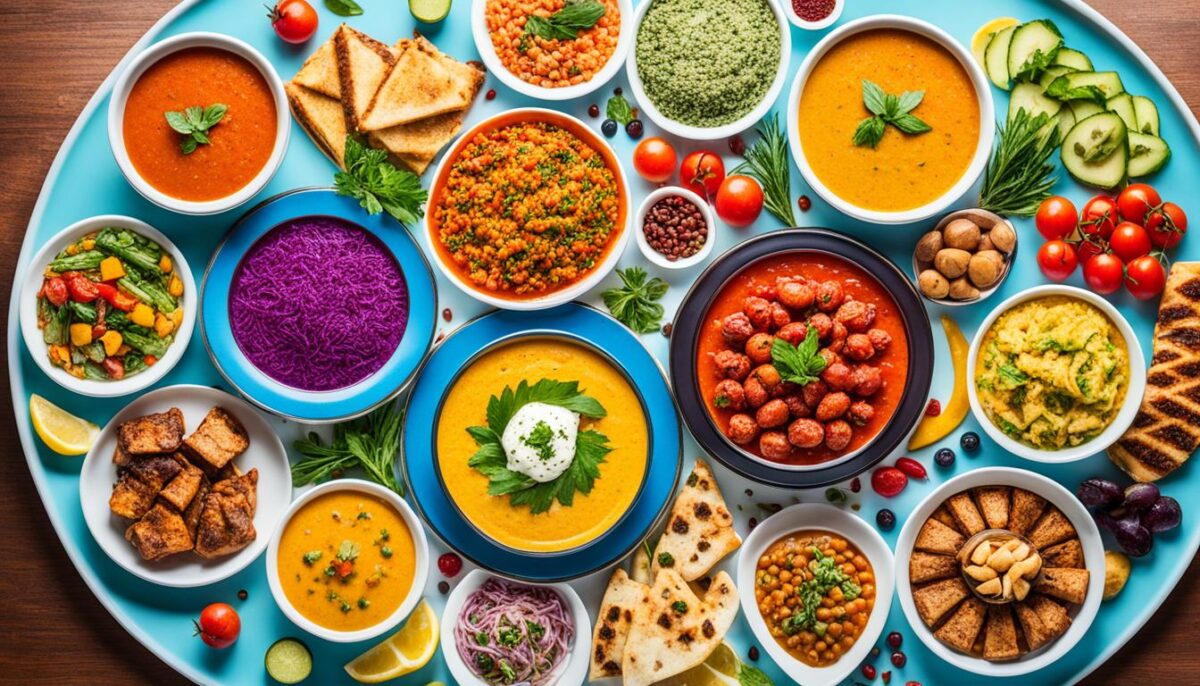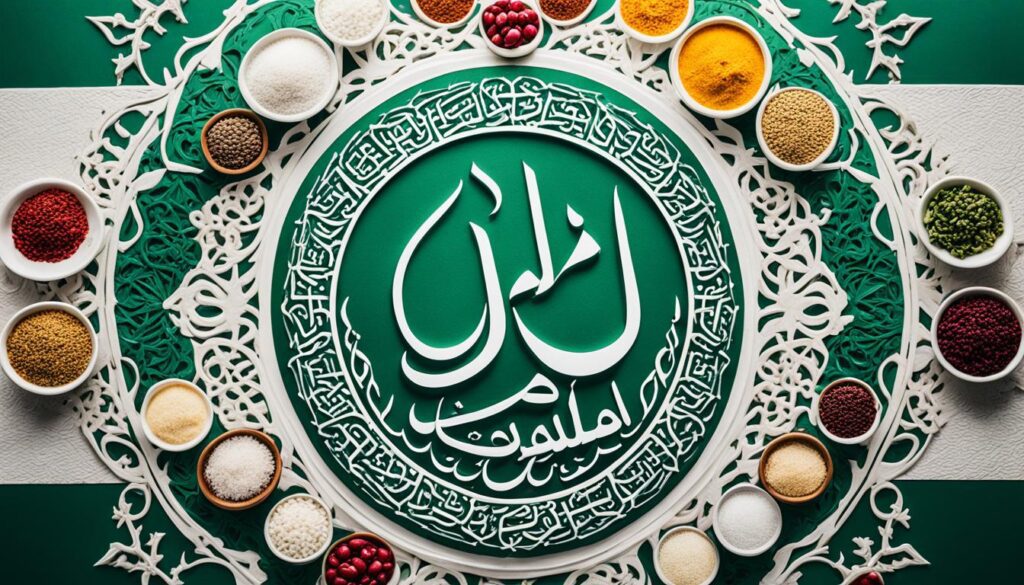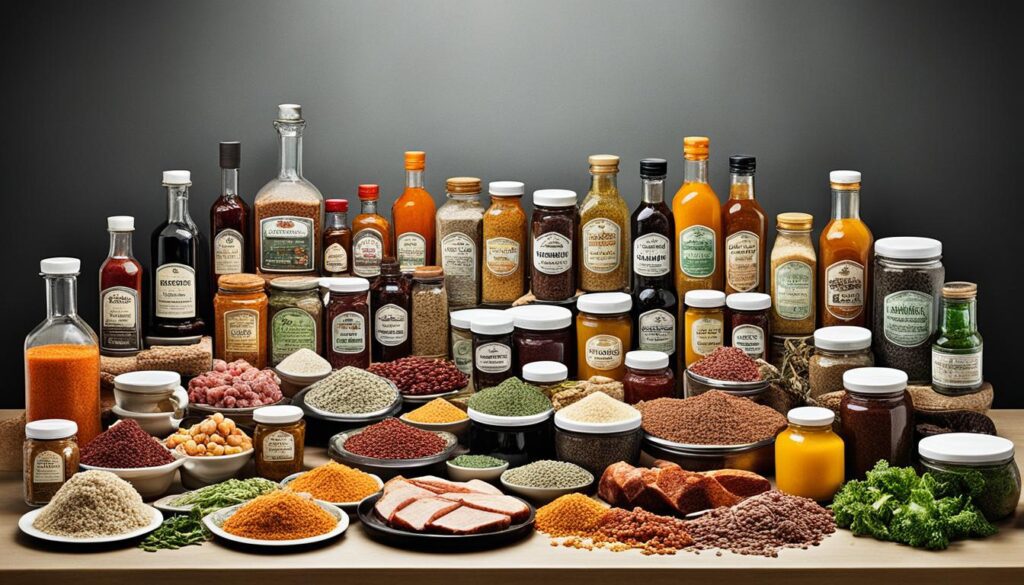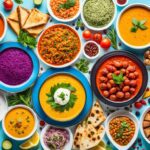In our vast world of foods, have you thought about what “Halal” means? With the increase in Muslim customers, knowing about Halal food is essential for everyone. You can discover a whole new world of what foods are allowed or not under Islamic laws.
Key Takeaways
- Halal food follows specific rules that allow eating certain things, like halal meat, and forbid others, such as pork and alcohol.
- The Quran says to eat food that is not only Halal but also Tayyib. This means it should be good, clean, and from ethical sources.
- Because of the careful Zabihah slaughter method, Halal meat is believed to be cleaner and better for you.
- Getting a Halal certification helps buyers trust that what they’re purchasing is allowed under Islamic law.
- With the growth of the Muslim population and their faith, the interest in Halal food is increasing worldwide.
The Meaning of Halal
“Halal” means things that are okay under Islamic teachings.1 Muslims are told to enjoy what God has given them. This includes being careful about what they eat.1
Halal: Permissible and Lawful
Halal covers many things that are allowed, even including what you eat and drink.1 Foods and drinks that are Halal come mostly from plants. But, they must not harm your health or mind.1 When it comes to meat, it needs to be slaughtered in a special way. This makes it okay to eat.1 Besides food, there are other halal things like cosmetics and even items used for packaging.1 Living a halal life means caring for animals and making sure they are treated well. It’s not just for Muslims but for anyone who wants to follow these rules.1
Haram: Forbidden Actions and Behaviors
Haram is the opposite. It’s what you can’t do in Islam.1 The Quran and Islamic teachings are clear about what is not allowed. This includes eating pork, drinking alcohol, and using drugs.1
| Halal: Permissible and Lawful | Haram: Forbidden Actions and Behaviors |
|---|---|
|
|
Islamic Dietary Laws and Zabihah
In Islam, the way animals are slaughtered for meat is called Zabihah. It’s seen as the kindest and purest method.2 This way of slaughtering is key in Islamic food laws. It also includes rules against pork, alcohol, and other harmful substances.3
Zabihah: The Islamic Method of Animal Slaughter
Zabiha slaughter starts with saying “Bismillah Allahu Akbar.” This is before the animal’s throat is cut. This method is meant to lead to quick blood loss by cutting important blood vessels.2 Halal groups around the globe make sure products meet Islamic food rules. This keeps the Halal status of many items, like meat, in check.2
Prohibited Foods: Pork, Alcohol, and Intoxicants
Islamic laws clearly say no to pork, alcohol, and drugs. These substances are known as Haram. This means they’re off-limits for those following Islam.3 Halal covers all the rules for okay meat to eat in Islam, not just about how the animal is killed.2 Some argue if stunning animals before slaughter fits Halal’s guidelines.2 Also, not all Halal-certified meats use the Zabiha way of slaughter.2
Halal stands for eating in a way that follows Islamic practices. Zabiha is about the specific way that animals are killed for food in Islam.2
What is Halal Food?
Halal food is any food that’s okay to eat under Islamic law, as the Quran says. There’s a big market for Halal food, valued at more than $1.3 trillion, thanks to more Muslims around the world. The rules say food and drinks are usually Halal unless they’re clearly forbidden. This helps Muslims know what’s okay to eat, following their religion.3
Getting a Halal certification is key for Muslims to trust that their food follows Islamic rules. This process includes thorough checks by trusted groups to make sure the food is truly Halal, from start to finish.3 Places and products that are Halal-friendly are growing in popularity. People worldwide want options that are guaranteed to meet Islamic dietary laws. Logos or symbols on packages show that a product is Halal, offering peace of mind.3
In the U.S., there’s more of a demand for Halal food, especially in big cities with many Muslims. To be considered Halal, food must be made the right way and not include haram ingredients.4 Halal food isn’t just meat; it can also be bread, dairy, sweets, and fruits and veggies.4
The Quran teaches that Muslims should eat good, clean food, not just what’s allowed. Halal food is not only safe but also better for you, especially the meat cut following Zabihah rules.3 This market growing helps businesses in countries where many Muslims live and those with fewer Muslims too.3
| Halal Food Criteria | Description |
|---|---|
| Permissible Ingredients | Halal food should not have haram things like pork, alcohol, or certain animals.4 |
| Slaughter Process | Meat should be slaughtered the right way to be Halal.3 |
| Preparation and Handling | Preparation of Halal food must follow special rules.4 |
| Certification | Reputable groups check and say if food is truly Halal.3 |
What’s Halal can be a bit different depending on who you ask. Some think avoiding certain foods is enough, like pork and alcohol. Others think the way the food is made is also really important.4 Not everyone agrees completely on what makes food Halal. Even scholars might see things a bit differently. The rules about Halal food sometimes get updated to fit with changes in how people believe.4
“The Quran instructs Muslims not only to consume Halal (permissible) but also Tayyib (good/clean/wholesome) food, promoting a holistic approach to dietary practices.”3
Halal and Tayyib: Beyond Permissibility
Halal in Islam is not just about what’s allowed; it’s also focused on Tayyib. This means the food is not only clean and pure but of high quality.3 The Quran tells us to “Eat of the good things which We have provided for you” (Quran 2:172). This shows the importance of both being Halal and Tayyib (Quran 2:168).
Tayyib: Clean, Wholesome, and Ethical
When we talk about Tayyib, we mean food that’s natural, good for the Earth, and kind to animals. It’s also about being ethical and not wasting.5 So, while food can be Halal, it might not always be Tayyib. Tayyib looks at the bigger picture, like how it’s made and its impact.
More and more people care about Tayyib, even if they’re not Muslim. They want food that follows their moral beliefs and is good for nature.3 A study found that 68% of these non-Muslims pick Halal food for its quality and health.3
This interest in Tayyib is changing the Halal food scene. Now, companies and groups set higher standards for Halal foods.3 They make sure these foods are good for the planet and come from ethical sources. This is all about meeting what people want: food that’s not just okay to eat but also supports well-being and takes care of the Earth.
Halal Meat: Understanding Permissible Animal Products
Halal meat comes from animals that Muslims are allowed to eat. These animals must be killed in a special way called Zabihah.6 Generally, all fish is considered Halal. Also, animals that only eat plants are fine as long as they are killed correctly.6 While there might be a few different opinions on this, the basic rules are the same in Islam.
The way animals are killed for Halal meat is important. Islamic law requires that their throats be cut quickly with a sharp knife. This method is chosen because it’s seen as the kindest and most respectful to the animal.7
| Halal Meat Slaughter Statistics | Percentage |
|---|---|
| Cattle stunned before slaughter in the UK | 84%7 |
| Sheep stunned before slaughter in the UK | 81%7 |
| Chickens stunned before slaughter in the UK | 88%7 |
In the EU, countries must make sure most animals are stunned before they’re killed.7 But, special rules can be made for religious reasons. In the UK, 15% of meat is prepared in the Halal way. This meets the needs of the country’s 2.7 million Muslims.7 They spend about £20 billion on food.7
Finding Halal food goes beyond how the animal is killed. The ingredients and how the food is made matter too.6 For example, food made using vanilla extract, which has alcohol, is not allowed.6 There are other things to avoid as well, like certain animal fats, gelatin, and certain types of meat.6 Always check the labels. Sometimes, manufacturers change things without letting us know.6
Haram Foods: Non-Halal Items in Islam
In Islam, it’s forbidden to consume alcohol and other intoxicants. They are considered Haram.8 The Quran advises Muslims to eat only what is pure and lawful. It warns against things like alcohol and other harmful substances.
Alcohol and Intoxicants
The Islamic belief values a clear and healthy mind and body. Drinking alcohol or using drugs is against this belief. So, Muslims are told to avoid anything that could harm their mental or physical health.
Pork and Pork By-Products
Eating pork and anything made from it is also off-limits in Islam. This rule comes from the Quran, which warns against the consumption of swine.8 Muslims must avoid pork, no matter how it is cooked.
Blood and Blood By-Products
Blood and foods with blood in them are against Islamic law. The Quran says not to eat animals that have died without being killed. This rule includes blood as well.
Predatory Animals and Birds of Prey
Animals that hunt with their teeth and birds that prey with their claws are Haram to eat.8 Islam sees them as possibly impure or dangerous. This is why their meat is not allowed.
Observing the rules on Haram foods is critical in Islamic practice. It helps Muslims make food choices that follow their faith’s guidelines.
Conditions for Halal Food and Beverages
For something to be considered Halal, it can’t contain Haram things.9 These are what’s forbidden by Shariah law. Also, they must be made, handled and moved by Halal methods.10
Ingredients and Preparation Methods
To be classified as Halal, the making of food and drinks has to follow strict rules.9 They can’t have Haram things like pork, alcohol, or non-Halal additives.10
Handling, Transportation, and Storage
Halal food and drinks’ handling, transportation, and storage need to obey Islamic laws.10 This means keeping them away from Haram things. It keeps them pure from start to finish.10
Safety and Cleanliness
Halal items have to be safe for humans. They should not be harmful in any way.9 Plus, they need to be made with clean equipment. This ensures safety and cleanliness are top-notch.9
Halal Certification: Ensuring Compliance
The Importance of Halal Certification
Halal certification shows that a food item meets Islamic dietary laws. A trusted group checks the product and its making process.3 Muslims can trust foods with this label to be lawful in Islam.3
Halal Certification Bodies
Various groups globally offer Halal certification. They make sure products meet strict Halal standards. This checks everything from raw materials to how food is made and packed.3
The Certification Process
Getting Halal certified is tough. It involves applying to a respected group, being checked to see if you meet standards, and then getting your certificate.3
Identifying Halal-Certified Products
You can spot Halal products by their special mark on the package.3 This mark is key for Muslims who want to ensure they are buying the right kind of food.3
What is Halal Food?
Halal food follows Islamic teachings and is allowed under Islamic law, which is written in the Quran. It means all food and drinks are okay unless the Quran says they’re not. This helps Muslims know what foods to eat that fit with their beliefs.3
When something is “Halal,” it’s good or right to do in Islam. The opposite, “Haram,” means it’s not allowed. So, all food is first thought of as Halal. This makes it clear for Muslims to follow the rules about what they can eat.3
Zabihah is how Muslims properly slaughter animals. This way, the meat is considered pure. It’s often seen as cleaner and better for you because the blood is mostly drained.3
Good Hawaain food, or “Tayyib,” is encouraged for Muslims. This includes avoiding pork, alcohol, and certain animals.3 They also can’t eat meat that wasn’t slaughtered the proper way or Zabihah.
Getting a Halal certificate means a product is approved for Muslims to eat. This boosts trust and opens new markets for companies.3
Looking for a special logo helps buyers find Halal-approved foods. This mark shows the product has been checked and is safe for Muslims.3
Countries may have different Halal rules, but there’s a push to make them more similar. This would make things easier for everyone.3
Dining Out: Finding Halal Restaurants
The Muslim population is growing, now at about 1.8 billion11. This growth makes halal dining options more in demand. All over, restaurants are getting halal certifications. This shows they follow Islamic dietary laws11.
Muslim-Friendly vs. Halal-Certified
Some places say they are “Halal-friendly” or “Muslim-friendly”. Yet, this might not be enough for many Muslims12. Truly halal places avoid pork or alcohol in their food. So, there’s no chance these items are in their dishes12. Muslims should check for Halal certification or community advice for truly Halal food.
We can find out about halal food from websites like Yelp and TripAdvisor11. Also, from social media like Instagram and Facebook, we get tips from other diners11. Being in online groups focused on halal dining helps find the best halal places11.
When eating out, looking for dishes clearly marked as halal, zabiha, or dhabiha helps. This makes it easier to pick the right food11. Also, a clean restaurant hints at good food handling. The staff should help with dietary needs and answer questions about their food11.
Always be careful if you’re unsure about food being halal. Most halal places don’t have alcohol. This suggests many truly adhere to halal rules12. Halal certifications come after strict checks. But, these checks might differ among restaurants12.
Now, there are apps to help find halal places. This shows a move towards using more technology in halal dining12. Choosing halal food is about more than religion. It’s also about being mindful of what we eat and how it’s produced12.
Conclusion
Halal food follows Islamic rules on what can be eaten. It lets people eat permissible things like halal meat but says no to pork and alcohol. This kind of food is becoming very popular, not just for Muslims but for everyone.13 More and more places are now selling halal food because people want it.
Halal foods care a lot about how animals are treated when they’re killed. This is a big draw for those who care about animal rights.13 They are also made with strict rules about cleanliness. This makes the food safer to eat and less likely to cause sickness.13 When animals are butchered, their blood is fully drained. This makes the meat fresher and tastier.13
The idea of halal comes from the Quran, which gives clear rules on food.14 As the number of Muslims grows, so does the market for halal food. People not from the faith are also choosing halal food for ethical and health reasons.14 But, the process of certifying something as halal is not the same everywhere. This can make things confusing for both sellers and buyers.14 Sometimes, food is wrongly labeled as halal, hurting consumer trust.14
Having a halal certification means that a food item meets the standards of the faith. It gives Muslims the assurance they need to enjoy halal food.13 The certification is very careful, making sure everything is done openly and can be checked. This way, people know they’re getting the right food.13 Halal eateries serve a rich mix of dishes, which attract anyone interested in trying new foods.13 With a wide range of halal foods available, diverse global tastes are honored. Finding the right balance between staying true to tradition and accepting new things is key.14
Making and selling halal foods lets businesses reach customers worldwide. This includes places not mainly Muslim.14 It also opens the door for coming up with new ideas for halal products. These might be both healthy and fancy, capturing the attention of many.14
FAQ
What is Halal food?
Halal food is prepared following Islamic dietary laws. It allows the eating of halal meat but bans pork and alcohol. These rules come from the Quran’s guidance on what’s okay to eat. The idea of Halal is central to Islam.
What is the meaning of Halal and Haram?
“Halal” means actions that are allowed in Islam. But “Haram” means actions that are not allowed by Islamic law.
How does Islamic dietary law define Zabihah?
Islam’s way of slaughtering animals for meat is called Zabihah. It’s seen as the best way to prepare meat. This method is a key part of Islamic eating rules, like avoiding pork and alcohol.
What is the difference between Halal and Tayyib?
The Quran tells Muslims to seek Halal and Tayyib foods. Tayyib means food that’s good and pure. It includes organic and healthy choices. Tayyib is also about respecting nature, being kind to animals, and not using too much.
What are the Haram foods prohibited in Islam?
Islamic law says that Muslims can’t eat pork, alcohol, or certain other things. This includes blood and some animals like birds of prey.
What are the conditions for Halal food and beverages?
Halal food or drinks must not have any Haram ingredients. Plus, they must be prepared in a way that follows Halal rules. This covers handling, making, and moving the products. It makes sure they don’t mix with anything that’s not Halal.
What is the importance of Halal certification?
Halal certification shows a food product follows Islamic dietary laws. It helps Muslims know what they’re eating is okay under Islamic rules. This makes buying food easier.
How can I identify Halal-certified products?
Look for the Halal symbol on the product’s package. This symbol means the product is Halal-approved by a trusted group. It helps Muslim shoppers pick out the right items.
What is the difference between Halal-friendly and Halal-certified restaurants?
Some places claim they are “Halal-friendly.” But this might not mean they truly serve Halal food. To be sure, Muslims should check for Halal certification or ask their community for advice.
Source Links
- https://halalfoundation.org/insights/what-is-halal/
- https://halalfoodcouncilusa.com/halal-vs-zabiha-what-is-difference-in-it/
- https://www.crescentrating.com/magazine/muslim-travel/4020/what-is-halal-food.html
- https://www.webmd.com/food-recipes/what-is-halal
- https://academic.oup.com/book/39928/chapter/340197633
- https://www.halalrc.org/images/Research Material/Literature/Guide to Halal Foods.pdf
- https://www.bbc.com/news/uk-27324224
- https://gfs.com/en-us/ideas/eating-according-religious-practices-kosher-and-halal/
- https://www.fao.org/3/y2770e/y2770e08.htm
- https://halalfoundation.org/halal-certification-requirements-for-food/
- https://halalfoodcouncilusa.com/how-to-determine-if-food-is-halal-when-eating-out/
- https://www.mazalv.com/eating-out-heres-how-to-spot-a-real-halal-restaurant.html
- https://www.iniburger.com/post/embracing-halal-the-surprising-benefits-of-halal-food
- https://halalfoodcouncilusa.com/halal-food-101-understanding-the-basics-of-halal-food-2/



